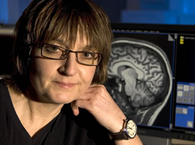News Release: Research, School of Medicine
Mar. 25, 2009
Fuqua Gift to Emory Researcher Will Advance Depression Research
 Helen S. Mayberg, MD
Helen S. Mayberg, MDHelen S. Mayberg, MD, professor in the Departments of Psychiatry and Behavioral Sciences and Neurology at Emory University School of Medicine, has been appointed to the Dorothy C. Fuqua Chair of Psychiatric Neuroimaging and Therapeutics. The J. B. Fuqua Family recently made a $2 million pledge to create the endowment.
This gift will help Emory psychiatrists and researchers use technical advances such as neuroimaging to understand the genetic and environmental components of depression and how they affect the brain. Leaders in the Emory Department of Psychiatry believe that within the next five years psychiatrists will be able to tailor treatment to each patient's individual brain chemistry.
"This gift allows Emory to continue the critical research and clinical care into new treatments for psychiatric disorders. By supporting cutting-edge research using neuroimaging, the Fuqua family has re-emphasized its commitment to helping all people who suffer from depression and other mental health issues by accelerating the work that can lead to better treatments and healthier lives," says Thomas J. Lawley, MD, dean of Emory University School of Medicine.
J. B. Fuqua was an entrepreneur who built a multimillion-dollar business empire that included television and radio stations and nearly two-dozen other companies. Fuqua became well known in his later years as a philanthropist and his family has maintained that legacy. His own battle with depression led to the first in a series of significant gifts made by him and his family to support Emory's initiatives in mental health.
Since 1999, gifts from the J.B. Fuqua Family to Emory include $1 million to found the Fuqua Center for Late-Life Depression at Wesley Woods. This center was created to fund initiatives in awareness and treatment of depression in older adults in rural and medically underserved regions of Georgia.
In 2003, J.B. Fuqua contributed $2 million to create the J.B. Fuqua Chair in Late-Life Depression in the Emory School of Medicine. A recent gift of $3 million from the Fuqua foundation created the J.B. Fuqua Fund, which allows the Fuqua Center for Late-Life Depression the resources to expand its outreach programs.
Fuqua's son, J. Rex Fuqua, established the J. Rex Fuqua Chair in Child Psychiatry. His gift was created to support Emory's progress toward both outpatient and inpatient short-term care and research activities and will serve as a training ground for future child and adolescent psychiatrists and psychologists.
The Dorothy C. Fuqua Chair of Psychiatric Neuroimaging and Therapeutics will allow Mayberg to study new therapies that fight depression. Research using imaging methods such as magnetic resonance imaging (MRI), functional MRI (fMRI), positron emission tomography (PET), and diffusion tensor imaging (DTI) in studies of behavior disorders is a rapidly expanding field. The approach is minimally invasive; the necessary equipment is increasingly available; and neuroimaging holds great potential for understanding normal and abnormal brain function.
For more than two decades Mayberg has done research on depression using neuroimaging to focus on neural network models of mood regulation in health and disease. Her work has led to a study testing deep brain stimulation (DBS) in the subcallosal cingulate region (Cg25) of the brain. A recent study on DBS in Cg25 conducted by Mayberg in collaboration with researchers at the University of Toronto showed improvement in depressive symptoms of study patients with treatment resistant depression. Mayberg is continuing an expanded version of this study at Emory that includes patients with bipolar disorder.
"It is a great privilege for me to be nominated for this Chair which honors the Fuqua Family's long-standing and significant commitment to the understanding and treatment of major depression – goals shared with the leadership of the Emory Department of Psychiatry for many years," says Mayberg. "The gift will further reinforce my own commitment to increasing the understanding of this extremely serious and disabling brain disease, and to eliminating the stigma associated with it."
"Additionally, it is a personal pleasure that this Chair will be named to explicitly recognize Mrs. Dorothy Fuqua as her determination, dedication, and contributions to her family, to Emory, and to the Atlanta community are a great inspiration to me."
The Dorothy C. Fuqua Chair represents a portion of the private support being sought for the recently announced Campaign Emory, a $1.6 billion fundraising endeavor that combines private support with the University's people, places and programs to make a powerful contribution to the world.
The campaign is expected to significantly enhance priorities for every school and unit of the university. Investments in the campaign fuel efforts to address fundamental challenges: improving health, gaining ground in science and technology, resolving conflict, harnessing the power of the arts, and educating the heart and mind.
###
The Robert W. Woodruff Health Sciences Center of Emory University is an academic health science and service center focused on missions of teaching, research, health care and public service. Its components include schools of medicine, nursing, and public health; Yerkes National Primate Research Center; the Emory Winship Cancer Institute; and Emory Healthcare, the largest, most comprehensive health system in Georgia. The Woodruff Health Sciences Center has a $2.3 billion budget, 17,000 employees, 2,300 full-time and 1,900 affiliated faculty, 4,300 students and trainees, and a $4.9 billion economic impact on metro Atlanta.
Learn more about Emory’s health sciences:
Blog: http://emoryhealthblog.com
Twitter: @emoryhealthsci
Web: http://emoryhealthsciences.org
